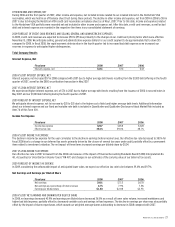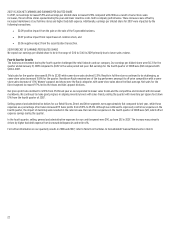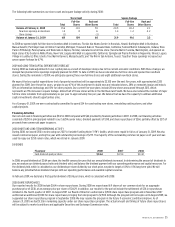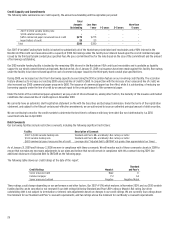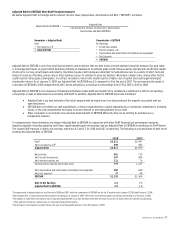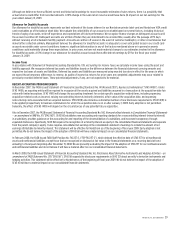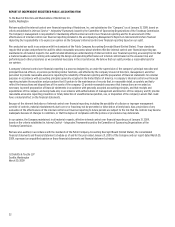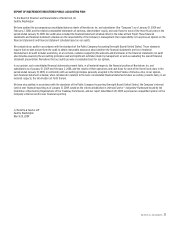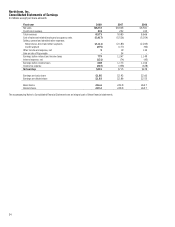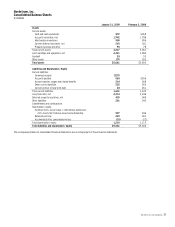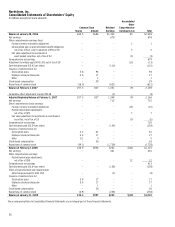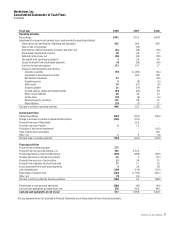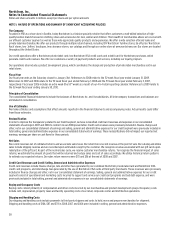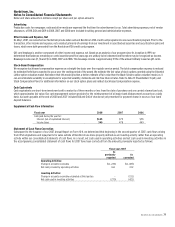Nordstrom 2008 Annual Report Download - page 29
Download and view the complete annual report
Please find page 29 of the 2008 Nordstrom annual report below. You can navigate through the pages in the report by either clicking on the pages listed below, or by using the keyword search tool below to find specific information within the annual report.Nordstrom, Inc. and subsidiaries 29
Although we believe we have sufficient current and historical knowledge to record reasonable estimates of sales returns, there is a possibility that
actual returns could differ from recorded amounts. A 10% change in the sales return reserve would have had a $4 impact on our net earnings for the
year ended January 31, 2009.
Allowance for Doubtful Accounts
Our allowance for doubtful accounts represents our best estimate of the losses inherent in our Nordstrom private label card and Nordstrom VISA credit
card receivables as of the balance sheet date. We evaluate the collectibility of our accounts receivable based on several factors, including historical
trends of aging of accounts, write-off experience and expectations of future performance. We recognize finance charges on delinquent accounts until
the account is written off. Delinquent accounts are written off when they are determined to be uncollectible, usually after the passage of 151 days
without receiving a full scheduled monthly payment. Accounts are written off sooner in the event of customer bankruptcy or other circumstances that
make further collection unlikely. Management believes the allowance for doubtful accounts is adequate to cover anticipated losses in our credit card
accounts receivable under current conditions; however, significant deterioration in any of the factors mentioned above or in general economic
conditions could materially change these expectations. In prior years, we have not made material changes to our estimates involved in the allowance
for doubtful accounts. A 10% change in our allowance for doubtful accounts would have affected net earnings by $9 for the fiscal year ended
January 31, 2009.
Income Taxes
In accordance with Statement of Financial Accounting Standards No. 109,
Accounting for Income Taxes
, we calculate income taxes using the asset and
liability approach. We recognize deferred tax assets and liabilities based on the difference between the financial statement carrying amounts and
respective tax bases of assets and liabilities. Deferred tax assets and liabilities are measured using enacted tax rates in effect for the years in which
we expect those temporary differences to reverse. As audits of income tax returns for prior years are completed, adjustments may occur related to
previously recorded deferred taxes. These potential adjustments, if any, are not expected to be material.
RECENT ACCOUNTING PRONOUNCEMENTS
In December 2007, the FASB issued Statement of Financial Accounting Standards No. 141 (Revised 2007),
Business Combinations
(“SFAS 141(R)”). Under
SFAS 141(R), an acquiring entity will be required to recognize all the assets acquired and liabilities assumed in a transaction at the acquisition-date fair
value with limited exceptions. SFAS 141(R) will change the accounting treatment for certain specific acquisition-related items, including expensing
acquisition-related costs as incurred, valuing noncontrolling interests (minority interests) at fair value at the acquisition date, and expensing
restructuring costs associated with an acquired business. SFAS 141(R) also includes a substantial number of new disclosure requirements. SFAS 141(R) is
to be applied prospectively to business combinations for which the acquisition date is on or after January 1, 2009. Early adoption is not permitted.
Generally, the effect of SFAS 141(R) will depend on the circumstances of any potential future acquisition.
Also in December 2007, the FASB issued Statement of Financial Accounting Standards No. 160,
Noncontrolling Interests in Consolidated Financial Statements
—
an amendment of ARB No. 51
(“SFAS 160”). SFAS 160 establishes new accounting and reporting standards for a noncontrolling interest (minority interest)
in a subsidiary, provides guidance on the accounting for and reporting of the deconsolidation of a subsidiary, and increases transparency through
expanded disclosures. Specifically, SFAS 160 requires the recognition of a minority interest as equity in the consolidated financial statements and separate
from the parent company’s equity. It also requires consolidated net earnings in the consolidated statement of earnings to include the amount of net
earnings attributable to minority interest. This statement will be effective for Nordstrom as of the beginning of fiscal year 2009. Early adoption is not
permitted. We do not believe the impact of the adoption of SFAS 160 will have a material impact on our consolidated financial statements.
In February 2008, the FASB issued FASB Staff Position No. FAS 157-2, (“FSP FAS 157-2”), which delayed the effective date of SFAS 157 for all nonfinancial
assets and nonfinancial liabilities, except those that are recognized or disclosed at fair value in the financial statements on a recurring basis (at least
annually), to fiscal years beginning after November 15, 2008. We are presently evaluating the impact of the adoption of SFAS 157 for our nonfinancial assets
and nonfinancial liabilities and do not believe it will have a material effect on our consolidated financial statements.
In March 2008, the FASB issued Statement of Financial Accounting Standards No. 161,
Disclosures About Derivative Instruments and Hedging Activities — an
amendment of FASB Statement No. 133
(“SFAS 161”). SFAS 161 expands the disclosure requirements in SFAS 133 about an entity’s derivative instruments and
hedging activities. This statement will be effective for Nordstrom as of the beginning of fiscal year 2009. We do not believe the impact of the adoption of
SFAS 161 will have a material impact on our consolidated financial statements.




